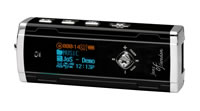ZOOTech’s Stuart Green believes that there is a fundamental problem with the way that DVDs are produced at the moment, and that means that production companies and publishers are not realising the full potential of the medium. Stuart is Chief Technology Officer at ZOOTech, a UK company redefining the way that DVD titles are created.
Extras, bonus features, mini-games and disk navigation are being created using a methodology that has grown out of traditional VHS production – and it’s time to change.
“The industry works in a counter-intuitive way – it’s very inefficient because it’s grown out of the video industry,” Stuart told me, “Assets for each title are created first, and it’s very laborious and costly. Consequently, content can be unambitious. Video, graphics, icons are all designed and sourced and then the structure of the disk is created. With each menu option or choice in a quiz game, choices can grow exponentially – testing can take huge amounts of time for very simple items. So, for a simple image gallery each page, every path and option has to be tested. Every step could potentially have a mistake.”
Stuart argues that this is the wrong way round, and wants to turn the production process on its head.
He has a strong case, too. In traditional multimedia production, the application is flow charted, designed and built first, and then the assets are added.
Enter ZOOTech’s DVDExtra Studio, and application based on the DVDExtra methodology. DVDExtra studio allows DVD developers to produce features, extras and DVD games that are as accomplished as CD-ROM based multimedia applications – without producing a CD-ROM title.
A DVD-based multimedia application has many advantages over a CD-ROM – there’s no installer, it’s instant, it can be operated via a remote, and it gets into the living room far more easily.
Developers plan the disk in DVDExtra Studio, which then uses a new compilation technique, Predictive Preprocessing, to evaluate all combinations of button press and checks all paths for dead ends and validity – it then generates the required assets. Generating assets for a DVD can be a time consuming task, says Stuart: “In DVD production, all assets have to be on the disk, as the player can’t render graphics. Complex disks from big studios can require tens of thousands of elements. Even simple disks need hundreds.”
Indeed, DVDExtra Studio has been used on the new Who Wants to Be a Millionaire DVD game. Previously, other versions of the game had been available on PC and PlayStation formats. This new version captures the feel of the TV programme much more closely with DVD quality video of Chris Tarrant, rather than the disembodied voice of the previous version – or the polygon rendered version of the last PS2 game. The DVD version required ZOOTech’s program to generate and keep track of more than 200,000 graphics.
The application also helps with localisation: during production, as text for each title is read in from a database, a project can be given a new translated text file and buttons and other assets will be automatically translated into the new language, getting a DVD title into more markets, faster.
DVD Extra Studio is compatible with Macromedia Flash and Director, tools traditionally used in multimedia production, and can accept input from both applications.
ZOOTech claim their application reduces the risk and development time of complex DVD components, saving money and freeing creative staff to make more immersive products. It also takes the format in new directions.
There are many limitations in the platform and player-related quirks that cause problems when authoring a DVD – for example it is extremely difficult to layer graphics on top of moving video because of player architecture. Also, since DVD players have limited logic capability, many features that multimedia developers take for granted, such as saving state between sessions, are simply impossible. DVDExtra Studio contains tools and workarounds for common requirements and quirks.
Being able to produce disks easily, Stuart says “opens up new markets hitherto unavailable – other kinds of disks, such as marketing DVDs for mailshots, training disks and point of sale material. It’s an outstanding medium for promotions that were previously just done on the internet. Imagine getting a DVD from a car manufacturer, and being able to specify exactly the colour scheme and options for a car – and seeing that car in DVD quality video.”
So, what next for DVD production? ZOOTech are working with hardware manufacturers to help production houses test disks for potential problems: “We’re creating new test disks with more demanding functionality on them, and working with manufacturers to gather information on incompatibilities – this will help producers work around limitations and anticipate problems.”
See ZOOTech, and Stuart at NAB, 17th to April 22nd, Las Vegas.
ZOOTech
NAB
 The latest MP3 Flash-memory music player from Jens of Sweden has just been announced (so recently that they don’t have English details available). The stylish devices has all you would expect from a mini-MP3 player, currently up to 512Mb of storage, record function dictaphone and FM-radio. Amazingly this little beauty weighs the same as eight sheets of A4 paper.
The latest MP3 Flash-memory music player from Jens of Sweden has just been announced (so recently that they don’t have English details available). The stylish devices has all you would expect from a mini-MP3 player, currently up to 512Mb of storage, record function dictaphone and FM-radio. Amazingly this little beauty weighs the same as eight sheets of A4 paper.